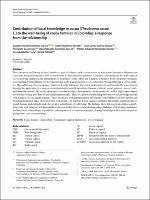| dc.contributor.author | Gutiérrez Garcia, Gustavo Adolfo | |
| dc.contributor.author | Gutiérrez Montes, Isabel A | |
| dc.contributor.author | Suárez Salazar, Juan Carlos | |
| dc.contributor.author | Casanoves, Fernando | |
| dc.contributor.author | Gutiérrez Suárez, David Ricardo | |
| dc.contributor.author | Hernández-Núñez, Héctor Eduardo | |
| dc.contributor.author | Butler Flora, Cornelia | |
| dc.contributor.author | Sibelet, Nicole | |
| dc.date.accessioned | 2024-11-22T20:17:35Z | |
| dc.date.available | 2024-11-22T20:17:35Z | |
| dc.date.issued | 2024 | |
| dc.identifier.uri | https://repositorio.catie.ac.cr/handle/11554/12703 | |
| dc.description.abstract | The concept of well-being of rural families is part of a theory under construction in which new theoretical elements are constantly being incorporated. This research aims to determine the influence of farmers’ knowledge on the well‑being of cocoa growing families in the departments of Santander, Huila, Meta and Caquetá, Colombia. Four categories of farmers were identified with different levels of knowledge in the management of cocoa cultivation obtained through a cluster analysis. The well-being of cocoa farmers, understood as the balance in the capital endowment of rural households, was obtained through the application of a semi-structured interview with 49 variables of human, cultural, social, political, natural, built, and financial capitals. The results show that cocoa knowledge is heterogeneous in the study area, with a slight improvement towards harvesting, post-harvest and transformation links. There is a positive relationship between cocoa knowledge and the well-being of cocoa farming families. Thus, producers with greater integral knowledge, with emphasis on post-harvest and bean transformation links, showed greater well-being. The Random Forest analysis identified that human capital (political, social, human, and cultural) made the greatest contribution to well-being. The findings show that cocoa knowledge contributes to the well-being of rural households to the extent that it favors vertical relationships (linkages with local governments) and horizontal relationships of producers (participation of association managers, sharing knowledge with friends, neighbors and partners, and cocoa training). | es_ES |
| dc.format.extent | 24 páginas | es_ES |
| dc.language.iso | en | es_ES |
| dc.publisher | Springer Nature | es_ES |
| dc.relation.ispartof | Agriculture and Human Values | es_ES |
| dc.relation.uri | https://doi.org/10.1007/s10460-024-10623-x | es_ES |
| dc.subject | Theobroma cacao||Theobroma cacao||Theobroma cacao||Theobroma cacao | es_ES |
| dc.subject | Conocimiento local||local knowledge||conhecimento local||connaissance locale | es_ES |
| dc.subject | agricultura familiar||family farming||agricultura familiar||agriculture familiale | es_ES |
| dc.subject | Manejo del cultivo||crop management||gestão da colheita||conduite de la culture | es_ES |
| dc.subject | Bienestar rural||rural welfare||undefined||bien-être rural | es_ES |
| dc.subject | Colombia||Colombia||Colômbia||Colombie | es_ES |
| dc.subject | Cacao | es_ES |
| dc.subject.other | Sede Central | es_ES |
| dc.title | Contribution of local knowledge in cocoa (Theobroma cacao L.) to the well‑being of cocoa families in Colombia a response from the relationship | es_ES |
| dc.type | Artículo | es_ES |
| dc.identifier.status | openAccess | es_ES |
| dc.subject.sdg | ODS 3 - Salud y bienestar | es_ES |


